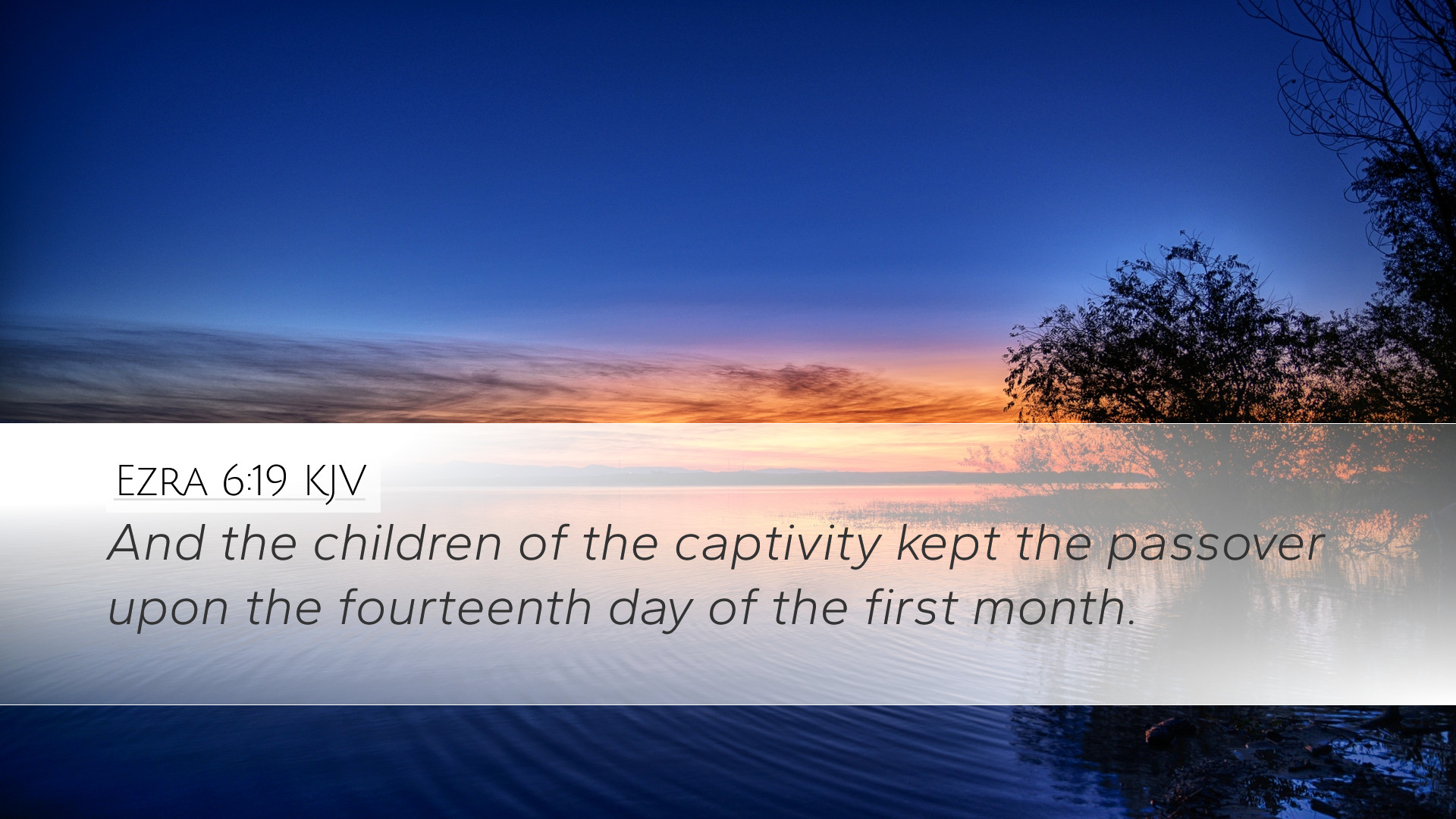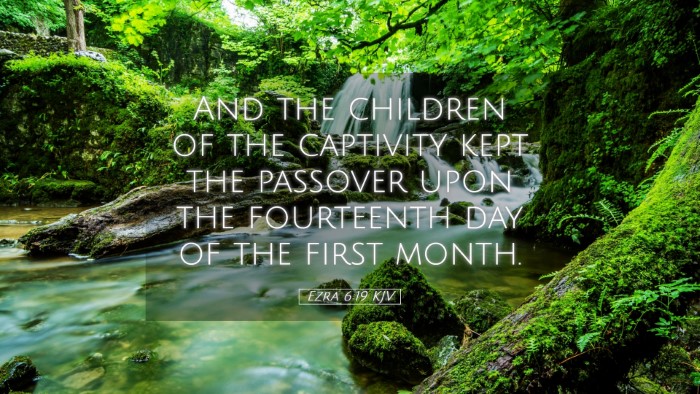Old Testament
Genesis Exodus Leviticus Numbers Deuteronomy Joshua Judges Ruth 1 Samuel 2 Samuel 1 Kings 2 Kings 1 Chronicles 2 Chronicles Ezra Nehemiah Esther Job Psalms Proverbs Ecclesiastes Song of Solomon Isaiah Jeremiah Lamentations Ezekiel Daniel Hosea Joel Amos Obadiah Jonah Micah Nahum Habakkuk Zephaniah Haggai Zechariah MalachiEzra 6:19
Ezra 6:19 KJV
And the children of the captivity kept the passover upon the fourteenth day of the first month.
Ezra 6:19 Bible Commentary
Commentary on Ezra 6:19
Introduction
Ezra 6:19 records the moment when the returned exiles in Jerusalem celebrated the completion of the rebuilding of the temple. This single verse encapsulates a significant transition for the Jewish people, their faith, and their communal identity post-exile. To fully grasp its depth and implications, insights from regarding the context, cultural significance, and theological resonance are essential.
Text of Ezra 6:19
"And the children of the captivity kept the Passover upon the fourteenth day of the first month."
Contextual Background
The historical backdrop of Ezra 6:19 is critical for understanding the weight of this verse. After the Babylonian captivity, the Jewish exiles had returned to Jerusalem under the decree of Cyrus. The rebuilding of the temple represented not just a physical restoration but also a spiritual renewal, marking the re-establishment of covenantal worship. This verse occurs just after the temple's reconstruction is completed, indicating a pivotal moment of restoration and celebration.
Insights from Matthew Henry
Matthew Henry reflects on the significance of the Passover in this context. He notes that this observance is a restoration of their national identity and religious practices after a long period of disruption. Henry emphasizes that keeping the Passover symbolizes their return to covenant faithfulness. He writes, "The going back to the Passover is a happy token of their recovery from their desolations and of their return to their own land," suggesting that this act was foundational for the community’s regeneration.
Insights from Albert Barnes
Albert Barnes elaborates on the implications of the Passover's observance. He notes that it serves as a prophetic foreshadowing of the greater salvation through Christ. Barnes points out the important detail that the Passover was celebrated on the fourteenth day of the first month, aligning with the ancient practice, thus indicating a recommitment to God's law and the traditions. His commentary emphasizes the importance of remembering God’s deliverance, drawing parallels to the deliverance experienced by the exiles.
Insights from Adam Clarke
Adam Clarke, in his analysis, underscores the theological significance of the communal celebration. Clarke states that the observance of the Passover symbolizes unity among the returned exiles, as they collectively affirm their commitment to God. He elaborates on the covenant aspect, mentioning how the Passover commemorates their deliverance from Egypt – an event that resonates deeply with their current situation. His insights highlight how the restoration of their worship practices is crucial for their identity as God's people.
Theological Reflections
This verse is rich in theological implications for the understanding of covenant, worship, and community. It illustrates how the act of worship carries forward the identity and heritage of a people. Celebrating the Passover serves to reaffirm both their historical salvation and their ongoing commitment to live as a people set apart for God.
Redemptive Historical Context
The passover represents a critical moment in the history of redemption. In celebrating it, the Jews in Jerusalem were not merely recalling a historical event but were also participating in a continuing story of God’s grace and deliverance. This act foreshadows the ultimate redemptive act: the sacrifice of Christ, the Lamb of God, who, in the New Testament, becomes the fulfillment of Passover.
Community and Identity
Moreover, the communal aspect of this celebration emphasizes the identity of the community. As they kept the Passover together, they were reaffirming their collective identity as the people of God. This is vital for church leaders and scholars to note—the role of communal worship in fostering a shared identity and purpose among believers.
Conclusion
Ezra 6:19, while succinct, invites pastors, students, and theologians alike to delve deeper into its profound implications. The act of keeping the Passover post-exile serves as a catalyst for reflecting on their identity, faithfulness, and spiritual heritage. The insights from public domain commentaries aid in understanding how this verse relates not merely to the ancient Jewish experience but also to the Church today.


